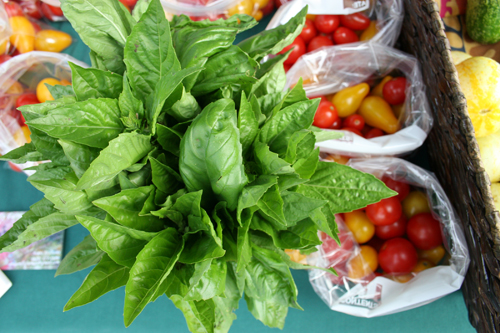Spaghetti sauce would be lost without oregano. Salsa just wouldn’t be the same without cilantro. Rosemary chicken would just be, well, chicken without rosemary.
All these dishes are made possible by herbs that can be grown in home gardens.
Herbs “are actually fairly easy to grow in Georgia,” said Paul Thomas, a University of Georgia horticulturalist. “We have the perfect temperature, the perfect sunlight and acceptable humidity. As long as you do the appropriate soil adjustments, herbs can be excellent garden plants to grow.”
Many herbs originated in the Mediterranean’s sandy, well-draining soil, not the hard-packed red clay encasing much of Georgia. To make herbs happy here, most gardeners need to add a few soil amendments and plant in pots or spots in their gardens that drain well.
Thomas manages well-drained soil in his potted herbs by adding lots of sand and compost to the soil. He also plants herbs that spread easily, like mint and oregano, in containers.
Out in the garden, Thomas digs a long trench two feet deep and fills it with thoroughly mixed compost, sand and native soil. In it he plants herbs that need a large root system, like fennel, rosemary and dill.
“The goal is to make sure when it rains or I irrigate, the water goes right through the soil and does not accumulate where the roots are,” Thomas said. “South Georgians will actually have to add more compost to the sand.”
Thomas’ favorite herbs are mint, basil, chives and rosemary. He adds mint to sweet tea, basil to turkey stuffing, pizza and salads and chives to soups, hamburgers and potatoes au gratin.
Although rosemary is one of his favorites, Thomas warns that rosemary shrubs can grow quite large. Even small plants can spread to three or four-feet wide.
Perennial herbs include rosemary, chives, oregano, marjoram and mint. Cilantro and parsley are annual herbs. Dill can be biennial.
To master herb growing, Thomas says follow these 10 rules:
1. Herbs do not like to sit in wet soil. An easy way to keep them happy is to plant them in a raised bed. Because the soil is above ground, it will drain very easily.
2. Water herbs thoroughly when they start flagging. They will tolerate drought but their flavors won’t be as strong. Never allow herbs to go more than two weeks without water.
3. Always plant herbs in full sun. If either their leaves or the soil doesn’t dry out after a rain, they will become more susceptible to diseases.
4. Never crowd an herb garden. Plant herbs a foot apart so air can move between the plants.
5. Never apply full strength fertilizers. If the package says 1 pound per 100 square feet, use half. Fertilizer minimally – once at the beginning of the growing season, four weeks later and then again another four weeks later after four weeks (about July). Follow treatments with a thorough watering.
6. Always harvest herbs in the morning. The cut surfaces of herbs need to be bone dry by mid afternoon or disease will take over.
7. Use a hose, not pesticides. If you find bugs on your herbs at 7 a.m., use a water hose and apply a spray from the side. The sideways water stream will wash the bugs off, and most never get a chance to return.
8. Leave the black and green and yellow striped caterpillars on fennel and dill. They are black swallowtail caterpillars. Keeping the larva on fennel will result in butterflies later in the summer.
9. Don’t let weeds crowd herbs out. This includes grasses as herbs cannot compete with them.
10. Never mulch herbs with leaves or other debris. Winter-mulched herbs do not survive well. Thomas’ herbs survive over winter because he rakes all the leaves out of his herb garden.
“You’ll find the more you use herbs, the more you treasure them,” Thomas said.










